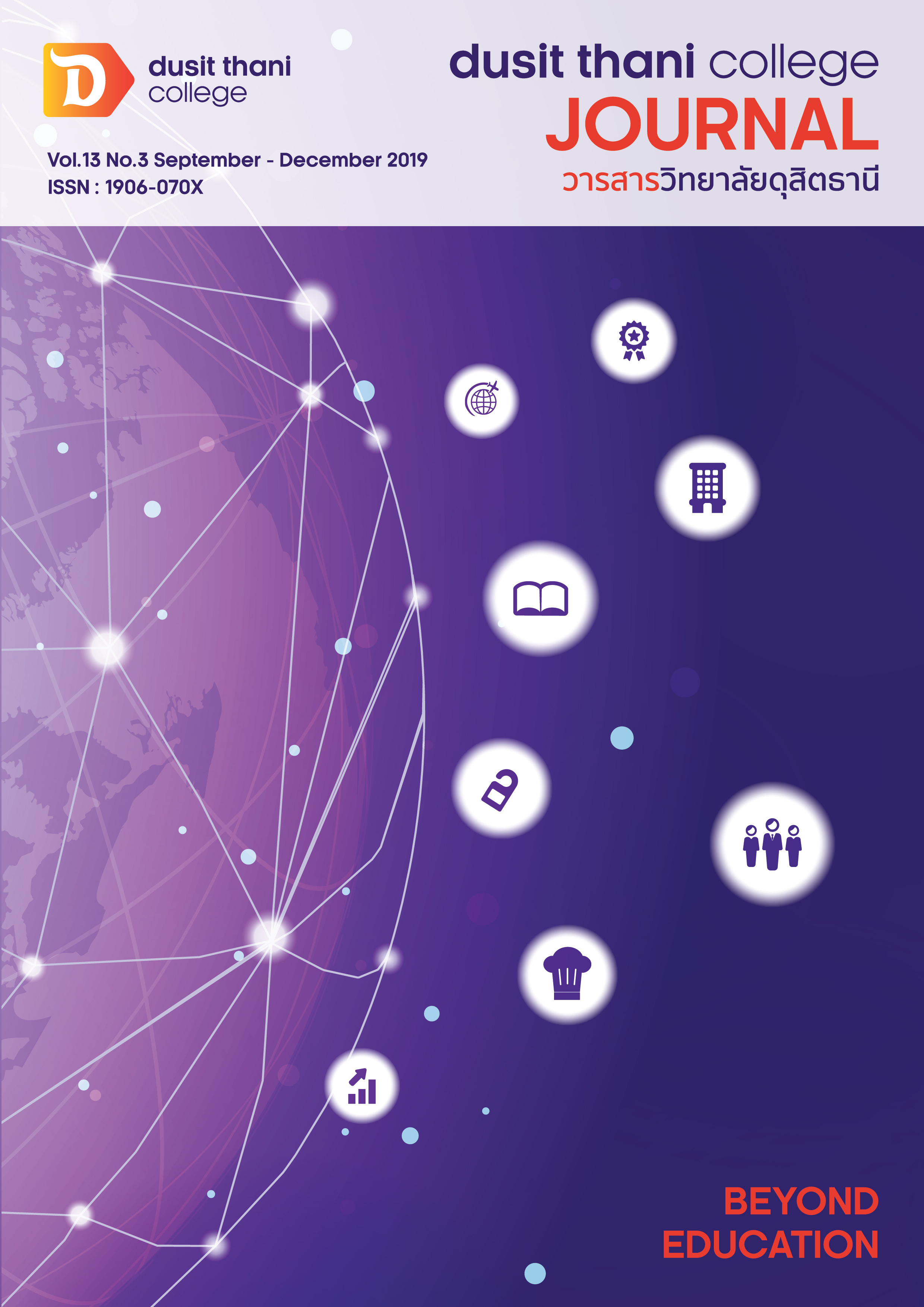Fieldtrip Advantages for Tourism Students: Contributing Towards Hierarchical Aspect of the Stimulus-Organism-Response (S-O-R) Theory
Main Article Content
Abstract
Fieldtrip is an important pedagogical means which tourism education in Thailand is actively pursuing. Nevertheless, the advantage of field trips manifested through the ability to see the actual theory in the practical field is relatively unexplored. This study thus proposes a stimulus-organism-response (S-O-R) framework as a platform bridging the abstract conceptualization of theory and concrete experience of field trip in experiential learning theory. To help researchers identify and operationalize the relevant constructs in the S-O-R model, socio-cognitive theory is adapted which provides, for instance, the destination environmental attributes, as the stimuli to induce perceptual working of students as tourists and thus loyalty response to the trip arrangement. The tourism students formed the population framework in which one-hundred-and-seventy valid responses were made available and provided the data base for multivariate statistical analysis. The measurement instrument was subjected to reliability and construct validity assessment, using statistical parameters such as total variance explained and cross-correlations, and definitions of variables and appropriate context as the rigorous guidelines. In particular, convergent and divergent validity assessments further support the construct validity. Structural equation modeling (SEM) analysis highlights both incremental (NFI=0.983, CFI=0.996 and TLI=0.991), and absolute fits (i.e. RMSEA=0.04, SRMR=0.0246) and illuminates the role of field trip in facilitating the data collection ground for testing and validating the theories – presenting an obvious pedagogical advantage for tourism studies.
Article Details
Article Screening Policy
- All research and academic articles to be published must be considered and screened by three peer reviews in the relevant field / article.
- All articles, texts, illustrations and tables published in the journal are the personal opinions of the authors. Editors don't always have to agree. And no responsibility whatsoever is the sole responsibility of the author.
- The articles to be published must never be published. Where did you first publish? And not in the consideration of other journals If the audit found that there has been a duplicate publication It is the sole responsibility of the author.
- Any article that the reader sees as being plagiarized or impersonated without reference. Or mislead the work of the author Please let the journal editor know it will be your greatest blessing.
References
2. Bandura, A. (1986). Social Foundations of Thought and Action: A Social Cognitive Theory. Englewood Cliffs, NJ: Prentice Hall.
3. Campon-Cerro, A.M., Hernandez-Mogollon, J.M. and Alves, H. (2016). Sustainable Improvement of Competitiveness in Rural Tourism Destinations: The Quest for Tourist Loyalty in Spain. Journal of Destination Marketing & Management. Retrieved from http://dx.doi.org/10.1016/j.jdmm.2016.04.005.
4. Fornell, C.G. and Larcker, D.F. (1981). Evaluating Structural Equation Models with Unobservable Variables and Measurement Error. Journal of Marketing Research. 18(1), 39-50.
5. Garvin, M.R. and Ramsier, R.D. (2003). Experiential Learning at the University Level:
A US Case Study. Education + Training. 45(5), 280-285.
6. Hair, J.F.Jr., Black, W.C., Babin, B.J., Anderson, R.E. and Tatham, R.L. (2006). Multivariate Data Analysis. USA: Pearson Prentice Hall.
7. Hurst, S.D. (1998). Use of Virtual Field Trips in Teaching Introductory Geology. Computers & Geosciences. 24(7), 653-658.
8. Jani, D. and Han, H. (2015). Influence of Environmental Stimuli on Hotel Customer Emotional Loyalty Response: Testing the Moderating Effect of the Big Five Personality Factors. International Journal of Hospitality Management. 44, 48-57.
9. Kelner, S. and Sanders, G. (2009). Beyond the Field Trip: Teaching Tourism through Tours. Teaching Sociology. 37(2), 136-150.
10. Kolb, D.A. (1984). Experiential Learning: Experience as the Source of Learning and Development. Englewood Cliffs, NJ: Prentice Hall.
11. Lepoutre, F. and Tan, C.C. (2014). A Value-Driven Service Quality Business Model for Museums: A Study Case in Northern Thailand. AFBE International Conference,
5-6 November 2014, Bangkok, Thailand.
12. Mehrabian, A. and Russell, J.A. (1974). An Approach to Environmental Psychology.
Cambridge, Massachusetts: MIT Press.
13. Nishio, K. and Kashihara, A. (2016). Retrip: A Learning Environment for Augmenting and Presenting Knowledge from Field Trip. Procedia Computer Science. 96, 1304-1313.
14. Procter, L. (2012). What Is It about Fieldtrips? Praxis, Pedagogy and Presence in Virtual Environments. Procedia – Social and Behavioral Sciences. 55, 980-989.
15. Ramseook-Munhurrun, P., Seebaluck, V.N. and Naidoo, P. (2015). Examining the Structural Relationships of Destination Image, Perceived Value, Tourist Satisfaction and Loyalty: Case of Mauritius. Procedia – Social and Behavioral Sciences. 175, 252-259.
16. Schank, R.C. (1997). Virtual Learning to Build a Highly Skilled Workforce. New York, NY: McGraw-Hill.
17. Stylos, N., Vassiliadis, C.A., Bellou, V. and Andronikidis, A. (2016). Destination Images, Holistic Images and Personal Normative Beliefs: Predictors of Intention to Revisit a Destination. Tourism Management. 53, 40-60.
18. Tan, C.C. (2016). Towards a Phenomenological Theory of Corporate Social Responsibility and its Spirited Services. India: IMRF Publication House. ISBN 978-93-84124-99-1.
19. Tan, C.C. (2017a). A Fieldtrip Approach to Study Tour Guide in Shaping Student Tourist Experience. Journal of Mekong Societies. 3(2), 23-44.
20. Tan, C.C. (2017b). Studying a Group Tour to Xishuangbanna based on a Stimuli-Organism-Response (S-O-R) Framework: Implications to Marketers and Policy Makers. Invited Talk at the International Science Congress Thailand (ISCTH) 2017, October 2-3 2017, Asian Institute of Technology.
21. Tan, C.C. (2018). An Advanced Strategic Management Text: A Research-Oriented Approach. Ibrahimpatnam, Krishna Dt, A.P., India: IMRF Publishing House.
22. Tan, S.K., Kung, S.F., and Luh, D.B. (2016). A Model of Creative Experience in Creative Tourism. Annals of Tourism Research. 41, 153-174.
23. Vieira, V.A. (2013). Stimuli-Organism-Response Framework: A Meta-Analytic Review in the Store Environment. Journal of Business Research. 66, 1420-1426.


